Information Technology Reference
In-Depth Information
Figure 14.1
A Circular Structure of Affect
Activation
Excited
Ebullient
Tense
Jittery
Upset
Distressed
Elated
Happy
Displeasure
Pleasure
Sad
Gloomy
Serene
Contented
Tired
Lethargic
Placid
Calm
Deactivation
Source:
Russell (2003).
personality characteristics (Ilies and Judge, 2002). Trait reflects the static aspect of information
processing that impacts a broad range of variables. By contrast, affective states can be theorized as
being “a product of variables such as stimuli reception context and individual differences” (Martin,
2003), and as varying over time and as having more dynamic influence on individuals' behavior
(Schmukle et al., 2002). The trait is empirically confirmed to be a predictor of the average level of
mood, a prolonged affective state (Weiss et al., 1999). From another perspective, state affect includes
a “dispositional” component, which refers to the trait affect (Schmukle et al., 2002).
Trait variables have no direct influence on behavioral intention. Psychological research sug-
gests that the influence of a trait variable on behavior is mediated by beliefs and affective factors
(e.g., Fishbein and Ajzen, 1975).
The organizational behavior literature also supports the causal relationship between affective
trait and state. For example, an individual's expression of affect at work could be strongly influ-
enced by personality traits. Weiss (2002) argued that “affective state but not beliefs mediates the
relationship between affective disposition (trait) and satisfaction” (p. 183). His argument is based
on one of his earlier works (Weiss et al., 1999), in which he empirically suggested that daily mood
levels mediate any effects of dispositional happiness on satisfaction. One mechanism through
which affective trait exerts its influence is interpretation of job circumstances, which is consid-
ered a “stimulus” of affect change in the workplace. For example, Brief (1998) argued that affect
traits determine how employees “interpret” the job circumstance, with “interpretation” referring
to “how a person construes or apprehends the objective circumstances of his or her job” (p. 96).








Search WWH ::

Custom Search